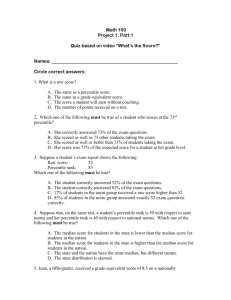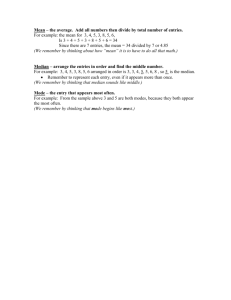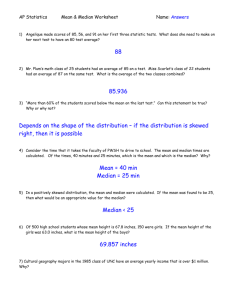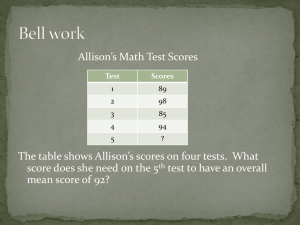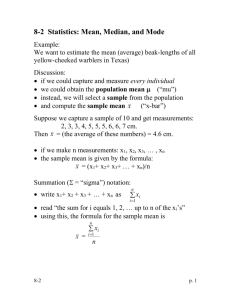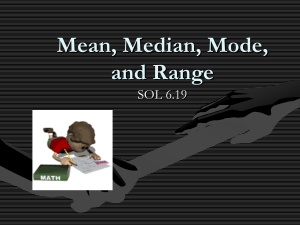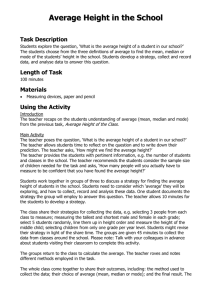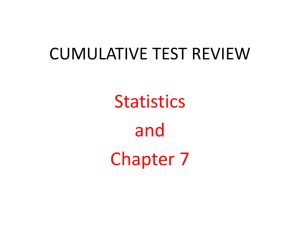Assessment Literacy Quiz based on “What`s the Score
advertisement
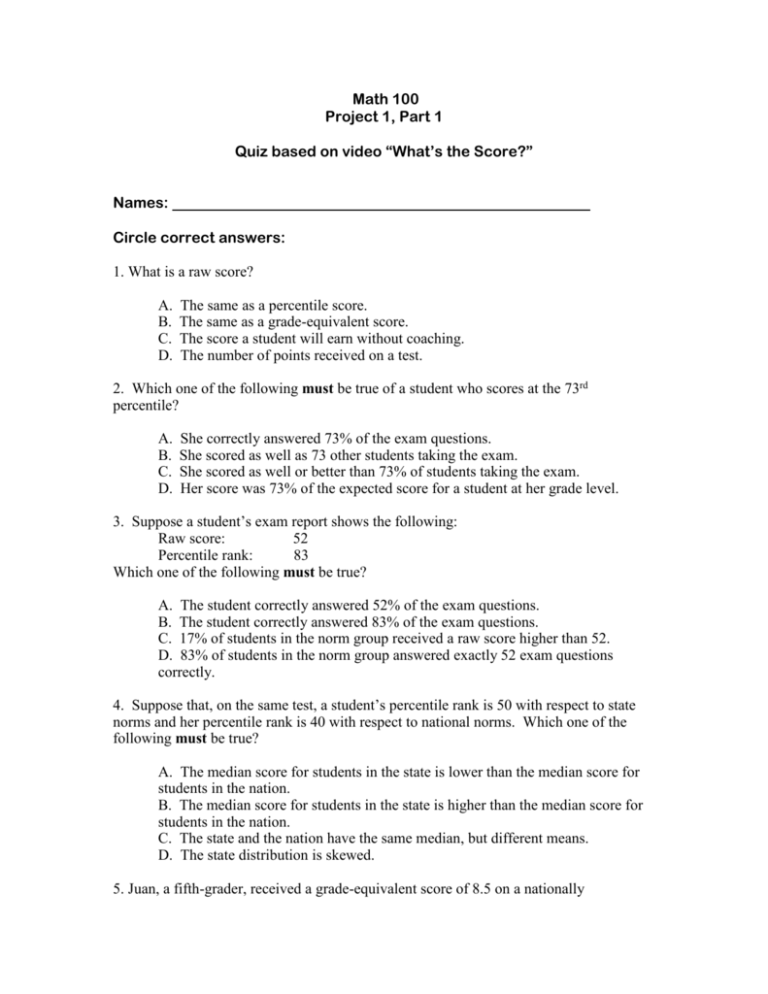
Math 100 Project 1, Part 1 Quiz based on video “What’s the Score?” Names: Circle correct answers: 1. What is a raw score? A. B. C. D. The same as a percentile score. The same as a grade-equivalent score. The score a student will earn without coaching. The number of points received on a test. 2. Which one of the following must be true of a student who scores at the 73rd percentile? A. B. C. D. She correctly answered 73% of the exam questions. She scored as well as 73 other students taking the exam. She scored as well or better than 73% of students taking the exam. Her score was 73% of the expected score for a student at her grade level. 3. Suppose a student’s exam report shows the following: Raw score: 52 Percentile rank: 83 Which one of the following must be true? A. The student correctly answered 52% of the exam questions. B. The student correctly answered 83% of the exam questions. C. 17% of students in the norm group received a raw score higher than 52. D. 83% of students in the norm group answered exactly 52 exam questions correctly. 4. Suppose that, on the same test, a student’s percentile rank is 50 with respect to state norms and her percentile rank is 40 with respect to national norms. Which one of the following must be true? A. The median score for students in the state is lower than the median score for students in the nation. B. The median score for students in the state is higher than the median score for students in the nation. C. The state and the nation have the same median, but different means. D. The state distribution is skewed. 5. Juan, a fifth-grader, received a grade-equivalent score of 8.5 on a nationally standardized math test. Which of the following is a correct interpretation of his score? A. Juan’s pattern of strengths and weaknesses in math are similar to those of an eighth grader. B. Juan should be capable of passing an eighth grade math class. C. Juan’s total score is equal to the average score for students in their fifth month of eighth grade. D. The number of questions Juan answered correctly is halfway between the eighth-grade average and the ninth-grade average. 6. Margarita scored at the 70th percentile nationally on a standardized test of writing skills. However, she scored at only the 60th percentile among females who took the test. Which of the following would explain this disparity? A. B. C. D. Females tend to score higher on this test than males. Females tend to score lower on this test than males. Fewer females than males take this test. The distributions for both males and females are skewed. 7. Cristina, a 3rd grader, recently took a state assessment in mathematics and correctly answered 75% of the questions. Her scaled score of 305 was 5 points higher than the minimum state proficiency cut-point in mathematics, which is 300. Which of the following must be true? A. A 3rd grader who answered 80% of the questions correctly would exceed the minimum proficiency cut-point in math in Cristina’s state. B. A 3rd grader who scored at the 75th percentile would exceed the minimum proficiency cut-point in math in Cristina’s state. C. The median score for 3rd-graders is less than 300. D. 25% of the 3rd graders in Cristina’s state scored higher in math than Cristina. 8. Edgar did not attain the minimum proficiency level on his state’s 5th grade reading comprehension exam, although his scaled score was at the 60th percentile for all 5th graders in his state. Which of the following must be true? A. The state’s minimum proficiency level for 5th graders is below the state median for 5th graders. B. 40% of the state’s 5th graders performed better than Edgar. C. 40% of the state’s 5th graders are at the minimum proficiency level or higher in reading comprehension. D. 5th graders must answer at least 60% of the reading comprehension items correctly to be considered proficient in Edgar’s state. 9. Suppose Cindy got a score of 87 on a test. Which one of the following results represents a criterion-referenced interpretation of that score? A. Her score exceeds that of 70% of her classmates. B. Her score exceeds that of 63% of students in the nation. C. Her score exceeds the minimum score that is considered “proficient “ in her state. D. Her score is higher by ten points than the score she received last year. 10. Which is an example of a norm-referenced score interpretation? A. Mark’s score was higher than the eighth-grade mean. B. Mark met the “proficient” performance standard for the state of Nevada. C. Mark answered 20 out of 25 test items correctly. D. Eighty percent of Mark’s answers were correct. 11. The average raw score on a spelling test given to a class of 5th graders is 50 points. If 75% of the students in the class scored below the average score on the test, then: A. The median score must be lower than 50. B. The median score must be equal to 50. C. The median score must be higher than 50. D. The median score must be equal to 75. 12. Suppose that the median score on your state's 6th grade math test has increased substantially between 2005 and 2015. The state norms table for the test was created in 2005. How will the increase in the median score affect the 2015 score distribution for your state? A. In 2015, more than 50% of students will score above the 2005 median. B. In 2015, fewer than 50% of students will score above the 2005 median. C. In 2015, the percentage of students above the 2005 median must, by definition, be equal to 50%. D. The mean of the 2015 distribution is likely to be smaller than the 2005 median. 13. If test scores follow a normal distribution with a mean of 60 and a standard deviation of 10, what is the median? A. B. C. D. 50 60 62.5 70 14. If the average score on a math test taken by a group of 11th grade students was 60 and the median score was 80, then which of the following must be correct: A. B. C. D. More than half the students scored above 80. More than half the students scored below 60. At least half the students scored above 60. The test is biased. 15. In a class of 30, 16 students received a score of 100, three students received a score of 0, and the remaining 11 students’ scores fell between those values. Which of the following must be true? A. B. C. D. The mode is smaller than the median The median and the mean are the same. The mean and the mode are the same. The median and the mode are the same.
